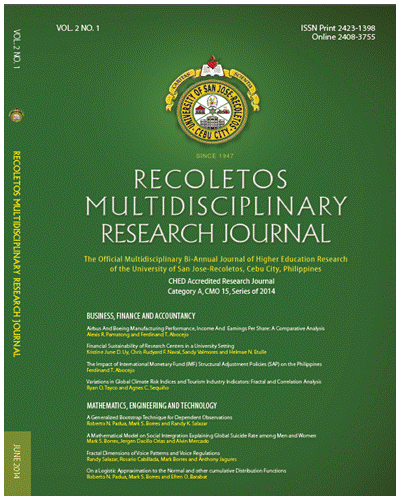A Correlational Analysis of Global Climate Risk Indices and Tourism Industry Indicators Using Fractal Statistics
DOI:
https://doi.org/10.32871/rmrj1402.01.04Keywords:
Climate Risk, Tourism Industry, Fractal Statistics, Correlation AnalysisAbstract
In this study, we demonstrate the use of techniques associated to a newly-developed fractal statistics in the analysis of data roughness of climate risk indices across the country as these induce a consequent ruggedness in the tourism industry indicators. Fractal dimensions and roughness correlation are used to show relationship while Pearson r correlation analysis to show association of the variables, climate risk index (as X variable), travel and tourism competitiveness, tourist arrival, tourism income and GDP per country(as Y variable). It is found out that climate risk condition is a cause of the decreases of the tourism activity and income of the country. The result lends proof thatn the weather patterns of a country, specifically climate risk condition, has considerable effects on tourism industry. Changing climate and weather patterns at tourist destinations and tourist generating countries can significantly affect the tourists’ comfort and their travel decisions. Influx in international tourist arrivals in response to climate risk affects all countries across the globe. However, developing countries are more vulnerable as they
have less resources and mechanisms to mitigate the impacts.
References
GDP per capita (current US$). (http://data. worldbank.org/ indicator/NY.GDP. PCAP.CD). Retrieved 2nd April, 2014.
Gössling, S., Scott, D., Hall, C. M., Ceron, J. P., & Dubois,G. (2012). Consumer behaviour and demand response of tourists to climate change. Annals of Tourism Research, 39(1), 36-58.
Harmeling, S. and Eckstein, D.(2012) Global Climate Risk Index 2013. Who Suffers Most from Extreme Weather Events? Weather-Related Loss Events in 2011 and 1992 to 2011. (https://germanwatch.org/en/download/7170.pdf) Retrieved 14th
November 2013.
“Interim Updateâ€.UNWTO World Tourism Barometer (2013).(http://mkt.unwto .org /en/publication/unwto-tourism-highlights-2013-edition). Retrieved 05th January 2014.
Most, W. S., & Weather, E. (2012). Global Climate Risk Index 2013.
Padua, R. (2013). On Fractal Probability Distributions:Results on Fractal Spectrum. (SSDSU Multidisciplinary Journal, Vol. 1, 87 – 92, CHED –
JAS B).
The Travel & Tourism Competitiveness Report 2013. Retrieved 3rd April, 2014. UNEP, 2008. Disaster Risk Management for Coastal Tourism Destination Responding to Climate Change. A Practical Guide for Decision-makers. 15, rue de Milan, 75441 Paris CEDEX 09, France.
UNEP, 2008. Disaster Risk Reduction. A toolkit for Tourism Destinations. Practical examples from Coastal Settlements in Asia. 15, rue de Milan, 75441 Paris CEDEX 09, France.
UNEP, 2007. Disaster Risk Reduction in Tourism Destinations. Disaster Reduction through Awareness, Preparedness and Prevention Mechanisms in Coastal Settlements in Asia-Demonstration in Tourism Destinations. 15, rue de Milan, 75441 Paris CEDEX 09, France.
United Nations World Tourism Organization & United Nations Environment Programme (UNWTO & UNEP) (2008). Climate change and tourism:
Responding to global challenges, Madrid: UNWTO & UNEP.(http://www.unep.org/greeneconomy/Portals/88/documents/ger/ger_final_dec_2011/Tourism%20in%20the%20green_economy%20unwto_unep.pdf). Retrieved 3rd March, 2014.
UNWTO. (2013). UNWTO Tourism Highlights, 2013 Edition Tourism. United Nations World Tourism Organizations. (http://mkt.unwto.org/en/
publication/unwto-tourism-highlights-2013-edition.pdf). Retrieved 3rd March 2014.
UNWTO, UNEP. “WMO (2008): Climate Change and Tourism–Responding to Global Challenges.â€Advanced Summary, October (2007).
World Bank Group (Ed.). (2012). World Development
Indicators 2012. World Bank Publications. “World’s top destinations by international tourism receiptsâ€. World Tourism Barometer.UNWTO.
(http://dtxtq4w60wqpw.cloudfront.net/sites/all/files/pdf.Worlds_top_destinations_pr_27.pdf). Retrieved 11th March 2014.
Downloads
Published
How to Cite
Issue
Section
License
Copyright of the Journal belongs to the University of San Jose-Recoletos


